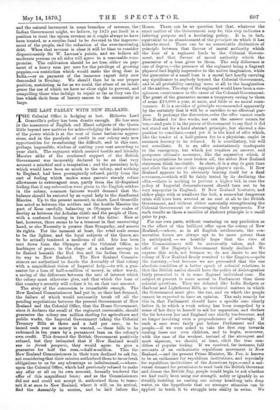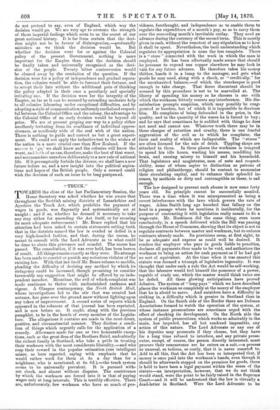THE LAST PARLEY WITH NEW ZEALAND.
THE Colonial Office is hedging at last. Hitherto Lord Granville's policy has been drastic enough. He has seen in the massacres of English and Maori subjects of the Queen little beyond new motives for acknowledging the independence of the power which is at the root of those barbarous aggres- sions, and in the paralysis of credit in our colony only new opportunities for re-enforcing the difficult, and in this case, perhaps, impossible, wisdom of cutting your coat according to your cloth. The regiment which assured hostile and friendly Maories alike of the continued support of the British Government was inexorably declared to be on that very account a mischief and a temptation ; and the pecuniary help which would have been so much to the colony, and nothing to England, had been peremptorily refused, partly from the sort of feeling which makes some parents sternly refuse allowances to extravagant sons, partly from the ill-disguised feeling that if any subvention were given to the English settlers in the colony, common fairness would demand that the balance should be restored by an equal help to the disaffected Maories. Up to the present moment, in short, Lord Granville has acted as between the settlers and the hostile Maories the part of Zeus carefully balancing on Olympus the scales of destiny as between the Achaian chiefs and the people of Ilion, with a confessed leaning in favour of the latter. Now at last, however, there seems to be a tremour in that unswerving hand, or else Necessity is greater than Sympathy, and asserts its rights. For the moment at least, the rebel scale seems to be the lighter, and the loyal subjects of the Queen are to be actually tendered a modicum of aid. Iris has been sent down from the Olympus of the Colonial Office, as harbinger of peace, in the shape of a radiant message to be flashed beneath the Red Sea and the Indian Ocean on its way to New Zealand. The New Zealand Commis- sioners are authorized to dazzle the Assembly of that colony with a magnificient vision of Imperial help,—to wit, a gua- rantee for a loan of half-a-million of money, in other words, a saving of the difference between the rate of interest which the colony must otherwise give, and that which the loan of this country's security will reduce it to, on that vast amount.
The story of the concession is remarkable enough. The New Zealand Commissioners had put in, as their last demand, the failure of which would necessarily break off all the pending negotiations between the present Government of New Zealand and the Colonial Office, that the Home Government, since it declares the recall of the regiment irrevocable, should guarantee the colony one million sterling for agriculture and public works, the Imperial Government taking the Colonial Treasury Bills at three and a half per cent., to be issued each year as money is wanted, — these bills to be redeemed in ten years by a permanent loan on the colony's own credit. This demand the British Government positively refused, but they intimated that if New Zealand would sue in fennel pauperis, they would agree to give a guarantee for half the sum,—half-a-million. This the New Zealand Commissioners in their turn declined to ask for, not considering that their mission authorised them to incur fresh obligations to us for any advantage so infinitesimal,—where- upon the Colonial Office, which had previously refused to make any offer at all on its own account, formally tendered the offer of this magnificent boon; and as the Commissioners did not and could not accept it, authorized them to trans- mit it at once to New Zealand, where it will, on its arrival, find the Assembly in session, and be laid before the House. There can be no question but that, whatever the exact motive of the Government may be, this step indicates a faltering purpose and a hesitating policy. It is, in fact, equivalent to an abandonment of the principle on which it has hitherto stood. There can be no conceivable distinction of principle between that flavour of moral authority which the loan of a regiment lends to the Colonial Govern- ment, and that flavour of moral authority which the guarantee of a loan gives to them. The only difference is one of degree,—the presence of the regiment being a flagrant physical fact highly impressive to the native inagination, while the guarantee of a small loan is a moral fact hardly carrying any significance to anybody beyond the Colonial Government, and in all probability carrying none at all to the imagination of the natives. The stay of the regiment would have been a con- spicuous countenance to the cause of the Colonial Government. The grant of the guarantee means a temporary saving to them of some £10,000 a year, at most, and little or no moral coun- tenance. It is a sacrifice of principle recommended apparently by the certainty that it will be a sacrifice to no effectual pur- pose. It prolongs the discussion,—for the offer cannot reach New Zealand for five weeks, nor can the answer return for ten,—and puts it in the power of Government to say that it did not stand out for a hard abstract principle, but showed a dis- position to conciliate,—and yet it is the kind of offer which, like the tender of a half-guinea fee to a physician, ought in common decency to be refused. It is conciliatory, but will not conciliate. It is an offer ostentatiously inadequate to the emergency, but which yet requires an answer, and postpones ultimate measures, like the separation which, if these negotiations be once broken off, the ablest New Zealand statesmen think inevitable. In short, it is a step to gain time and elicit the nature of the opposite player's cards. If New Zealand appears to be obviously bracing itself for a final severance,—which will be fairly tested by its declining the offer,—there is nothing to prevent a higher bid, in case the policy of Imperial dismemberment should turn out to be very unpopular in England. If New Zealand hesitates, and either plays with or swallows the bait, a somewhat dangerous crisis will have been averted at no cost at all to the British Government, and without either materially strengthening the Colonial Government or discouraging their opponents. For such results as these a sacrifice of abstract principle is a small price to pay.
For our own parts, without venturing on any prediction as to the effect of this brilliant offer upon the colony of New Zealand,—where, as in all English settlements, the con- servative forces are always apt to be more potent than is anticipated, — we heartily hope that the view of the Commissioners will be universally taken, and the offer of Her Majesty's Government firmly declined. We express this wish, not because we do not desire to see the colony of New Zealand firmly reunited to the Empire,—quite the contrary,—but because we are persuaded that the one absolute condition of a better epoch of colonial relations, is that the British nation should have the policy of disintegration fairly presented to it in some flagrant individual case. No subject at present is more unreal to Parliament than these colonial questions. They are debated like India Budgets or Harbour and Lighthouse Bills, as technical matters in which the Government must give the cue, and on which the people cannot be expected to have an opinion. The only remedy for this is, that Parliament should have a specific case clearly before it, in which a weak colony has been compelled by a sense of her duty to herself to ask for separation, and declare the tie between her and England one chiefly burdensome, and no longer involving even a preponderance of advantage. If such a case were fairly put before Parliament and the people,—if we were asked to take the first step towards casting loose our own children, and to begin, moreover, .with the case of the weakest, instead of the strongest and most vigorous, we should, at least, elicit the true con- dition of popular feeling. If we received, for instance, full accouuts of an enthusiastic republican movement in New Zealand,—and the present Prime Minister, Mr. Fox, is known to be an enthusiast for republican institutions, and especially for republican institutions of the American type,—and a uni- versal demand for permission to send back the British Governor and disuse the British flag, people would begin to ask whether we had really been using our strength nobly or ignobly in so steadily insisting on casting our colony headlong into deep water, on the hypothesis that no stronger stimulus can be applied to teach it to struggle into ability to swim. We do not pretend to say, even of England, which way the decision would go. We are very apt to overrate the strength of those imperial feelings which seem to us the secret of our great national history. It is far from certain that the deci- sion might not be in favour of disintegration,—profoundly mistaken as we think the decision would be. But whether the decision went for or against the Colonial policy of the present Government, nothing is more important for the Empire than that the decision should be finally taken and universally recognized as the deci- sion of the people. Twenty bitter controversies would be cleared away by the resolution of the question. If the decision were for a policy of independence and gradual separa- tion, the colonies would be able to forecast their fortune, and to accept their fate without the additional pain of thinking the policy adopted in their case a peculiarly and specially irritating one. If the decision were for the integrity of the Empire, so far as it can be secured by extending moderate help to all colonies labouring under exceptional difficulties, and by adopting a style of communication uniformlycordialand respect- ful between the Colonial Office and the colony, the advantage to the Colonial Office of an early decision would be beyond all price. We are at present groping our way to a policy either needlessly irritating from its semblance of individual oppres- siveness, or needlessly wide of the real wish of the nation. There is nothing to guide and correct us but a great experi- ment. We could not apply the inductive test to the wishes of the nation in a more crucial case than New Zealand. If the answer is go,' we shall know and the colonies will know the worst, and both of us can,therefore, make the best of that worst, and accommodate ourselves deliberatelyto a new rule of national life. If it peremptorily forbids the divorce, we shall have a new future before us, and a new insight into the political aspira- tions and hopes of the British people. Only a coward could wish the decision of such an issue to be long postponed.































 Previous page
Previous page